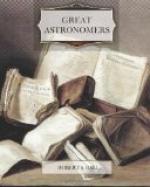“His reciting is astonishing, and his clear and accurate knowledge of geography is beyond belief; he even draws the countries with a pencil on paper, and will cut them out, though not perfectly accurate, yet so well that a anybody knowing the countries could not mistake them; but, you will think this nothing when I tell you that he reads Latin, Greek, and Hebrew.”
Aunt Sydney recorded that the moment Willie got back to Trim he was desirous of at once resuming his former pursuits. He would not eat his breakfast till his uncle had heard him his Hebrew, and he comments on the importance of proper pronunciation. At five he was taken to see a friend, to whom he repeated long passages from Dryden. A gentleman present, who was not unnaturally sceptical about Willie’s attainments, desired to test him in Greek, and took down a copy of Homer which happened to have the contracted type, and to his amazement Willie went on with the greatest ease. At six years and nine months he was translating Homer and Virgil; a year later his uncle tells us that William finds so little difficulty in learning French and Italian, that he wishes to read Homer in French. He is enraptured with the Iliad, and carries it about with him, repeating from it whatever particularly pleases him. At eight years and one month the boy was one of a party who visited the Scalp in the Dublin mountains, and he was so delighted with the scenery that he forthwith delivered an oration in Latin. At nine years and six months he is not satisfied until he learns Sanscrit; three months later his thirst for the Oriental languages is unabated, and at ten years and four months he is studying Arabic and Persian. When nearly twelve he prepared a manuscript ready for publication. It was a “Syriac Grammar,” in Syriac letters and characters compiled from that of Buxtorf, by William Hamilton, Esq., of Dublin and Trim. When he was fourteen, the Persian ambassador, Mirza Abul Hassan Khan, paid a visit to Dublin, and, as a practical exercise in his Oriental languages, the young scholar addressed to his Excellency a letter in Persian; a translation of which production is given by Mr. Graves. When William was fourteen he had the misfortune to lose his father; and he had lost his mother two years previously. The boy and his three sisters were kindly provided for by different members of the family on both sides.
It was when William was about fifteen that his attention began to be turned towards scientific subjects. These were at first regarded rather as a relaxation from the linguistic studies with which he had been so largely occupied. On November 22nd, 1820, he notes in his journal that he had begun Newton’s “Principia”: he commenced also the study of astronomy by observing eclipses, occultations, and similar phenomena. When he was sixteen we learn that he had read conic sections, and that he was engaged in the study of pendulums. After an attack of illness, he was moved for change to Dublin, and in May, 1822, we find him reading the differential calculus and Laplace’s “Mecanique Celeste.” He criticises an important part of Laplace’s work relative to the demonstration of the parallelogram of forces. In this same year appeared the first gushes of those poems which afterwards flowed in torrents.




